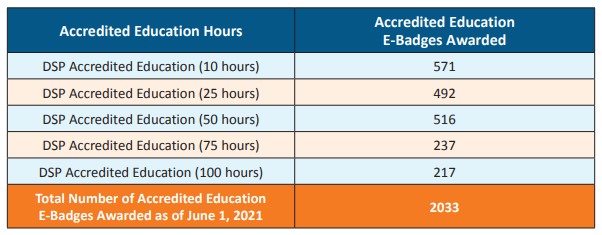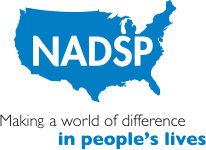
Results By The Numbers: Accredited Education E-Badges
The following article is an excerpt from the NADSP report titled ‘The NADSP E-Badge Academy: Integrating Direct Support Professional Knowledge, Skills & Values into a National Career Ladder Program,’ which lays out how the E-Badge Academy can be used as the foundation for a Career Ladder program for direct support professionals (DSPs) and frontline supervisors. The article describes how Accredited Education E-Badges are used in the E-Badge Academy and why they’re an important component of NADSP Certification.
While the NADSP does offer training curricula in a variety of specialty areas, it’s important to note that the E-Badge Academy is NOT a training program. We are committed to forging partnerships with training organizations to review and accredit their product. This certification program offers DSPs and their employers’ access to a wide range of products to choose one that fits their specific needs. As of October 2021, the following training curricula have been approved to meet our standards for certification.
Achievement Of Accredited Education E-Badges
For the first time at a national level, the E-Badge Academy is raising the standards for DSP training. We are now able to review DSP’s records of accredited training content, quantify the amount of accredited training that was received and recognize & reward them by offering E-Badges for their professional education that also leads to certification. See the results below:

While it is difficult to determine exactly how many accredited training hours have been completed in the E-Badge Academy, a conservative estimate would be that at least 36,650 hours of competency-based training have been submitted and approved as of June 1, 2021.
The Impact Of The E-Badge Academy
Since its launch in January 2019, the E-Badge Academy has improved DSP practice standards and provided much needed recognition for the complexity of direct support services. It has significantly reduced turnover for DSPs who achieve certification in agencies that built career ladder programs. Most importantly, it has led to meaningful and improved outcomes for people with intellectual and developmental disabilities across the United States.
The NADSP E-Badge Academy & Career Ladders
You May Also Be Interested In …

E-Badge Academy Five Year Infographic

E-Badge Academy Frequently Asked Questions

Moving From Crisis To Stabilization

The NADSP E-Badge Academy & Career Ladders

